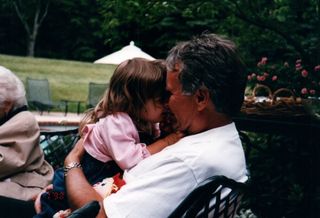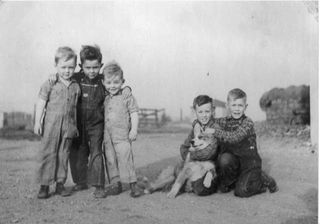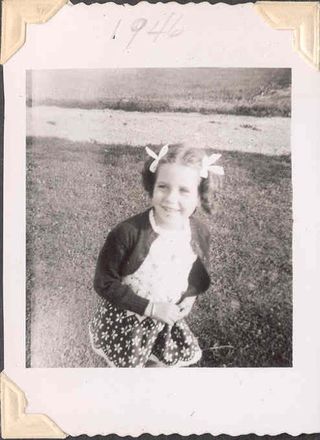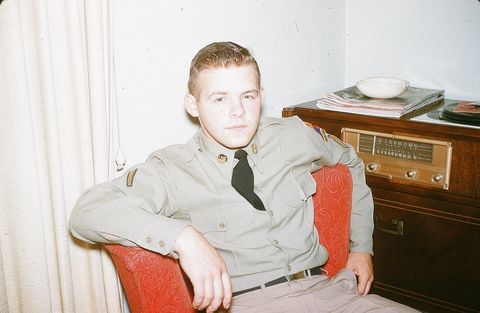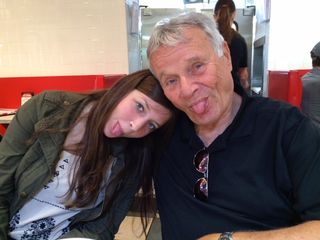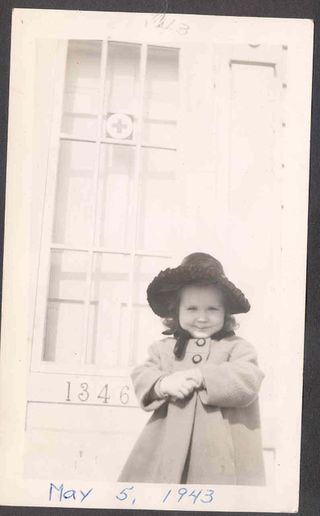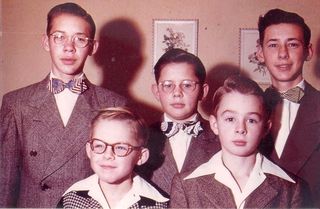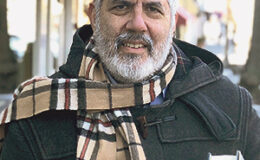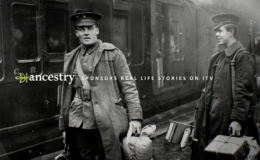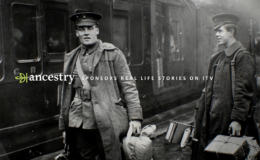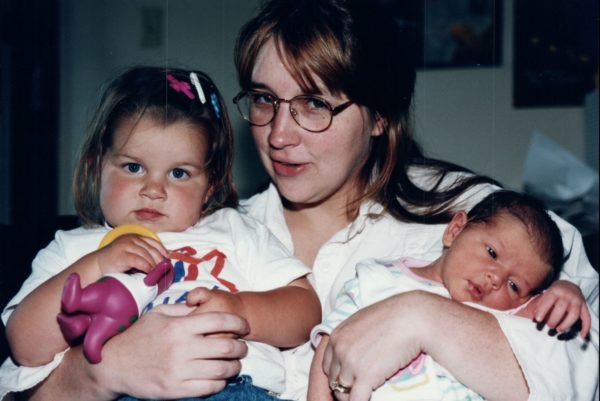
This article is part of WomansDay.com’s series on mini monthly resolutions and challenges. The first challenge is all about discovering and recording your family history.
An idea seems to persist that family history, like the study of history in general, is mostly about the discovery of names and dates. But tracing your family history should be about so much more than filling in the branches of a family tree. For genealogist and historian David Allen Lambert, it’s all about the dash. “The years on someone’s gravestone are when they lived,” he told Woman’s Day. “The dash represents how they lived.”
Lambert is the chief genealogist at American Ancestors and New England Historic Genealogical Society, the biggest genealogical society of its kind in the world, and he’s one of the experts I talked to as I embarked on this month’s mini-resolution: to learn about my family history. As I set forth on my family history mission, I leaned on his words like a sort of genealogical mantra. What’s in the dash?
I should begin by noting that I come by my curiosity rather naturally: My mother is an active member of the Daughters of the American Revolution, a women’s service organization with a historical focus whose members have traced their ancestry back to the Revolutionary War. She likes to spend her Saturday nights digging through birth documents, marriage certificates, and digitized cemetery records, occasionally popping her head out from the office to pronounce “I found a dead person!” with excitement.
But for this project, I didn’t want to use the information she had already gathered. I wanted to start from scratch, focusing less on hard data than on fostering a sense of closeness and connection with the oldest living members of my family, my grandparents. I set out to record some aspects of their lives, personalities, and childhood dreams that could live on as a literary complement to my mother’s dates and records.
I wanted to know who my grandparents were before I knew them. As a young, college-educated woman living in New York City, how is my life similar to and different than my grandmother’s when she was my age, newly married in a small town in Illinois? And what exactly would I do with all this information once I’d gathered it? How do you preserve your family history for people who aren’t even born yet? I had a lot of learning to do.
Where to begin
When I decided that my first mini-resolution of 2020 would be learning about my family, I was excited, but overwhelmed. Where do you even begin with a project so big that the main question in essence is Where do I come from?
I started by leaning on my training as a journalist. As I interviewed genealogical experts, many of them offered the same advice: Start with what you know, and start with yourself.
“Write down what you know,” Lambert said, specifying names, birth dates, marriage dates, and death dates. “Then consider what parts of that tree can you find by picking up the phone. Contact older relatives. If you have a grandparent, that’s great, some people have even older relatives. And you can interview them and ask about their grandparents.”
Judy G. Russell, a genealogist, former lawyer, and author of the popular blog “The Legal Genealogist,” says talking to the living members of your family is “the single most important thing” to do when you begin looking into your family history. “That’s a resource we don’t tap nearly enough, but that’s where the family stories are,” Russell says. “The bottom line is that our parents and our grandparents and our aunts and uncles lived through times we didn’t, and they know the people from the older generations that we never met. Those links and those stories need to be captured before we do anything else.”
So after I wrote down all the general information I know about my immediate and extended family, I followed the advice of the experts and set up times to talk to my grandparents.
But what do you ask them?
Getting your relatives on the phone is one thing, but knowing what to ask them when you’ve got them there is quite another. When you’re dealing with older relatives who have lived 70 or more years, how do you help them access old memories, and where do you begin with a life so thoroughly lived? And how do you go about asking these questions without feeling like a paparazzo shoving a microphone in their face?
Russell recommends thinking about important historical events that happened during their lifetime and starting there. “Events that shaped the nation and would’ve shaped them as well” are a good jumping off point, she says. For example, what do they remember about the attack on Pearl Harbor? What about the Great Depression or World War II? Where were they when President Kennedy was shot?
If you’re reluctant to jump into big events, start with more simple questions that can lead to personal stories. For example, what was grade school like for you? What was your favorite class? Did you work or play sports after school? Questions like these can help ease your relative into the conversation, and they can lead to some funny stories and new information. When I asked these questions, I learned that my grandfather, who I always pictured as a star student, had a C+ average and never studied. I also learned that part of the reason he never studied was that he spent his time outside of school working for his parent’s small business. You’ll be surprised how much you learn from a simple question, and how it can lead the conversation to an unexpected place.
In that vein, come to the conversation prepared with questions, but allow it to meander as the person your interviewing remembers interesting things they want to tell you. “Have your set questions, but let them tell the story,” Lambert says.
If you’re lucky, you’ll find yourself talking to a family member who’s eager to share and has loads of information, but it can be a good idea to limit the length of the conversation. Kenyatta D. Berry, a genealogist who literally wrote the book on where to begin with family history — The Family Tree Toolkit: A Comprehensive Guide to Uncovering Your Ancestry and Researching Genealogy — suggests limiting your interview to two hours max, though one hour is a better place to start. “You want to get the information, but you don’t want to wear them out,” she says.
As you speak with family members, Berry emphasized how important it is to make detailed notes about where all of this information is coming from. “As you’re talking and interviewing people, make sure you’re recording it, and make sure you cite your sources,” she says. For example: I interviewed this person on this date in this place. And if you’re given any documents or photos, write down who gave it to you, on what date, and indicate who’s in the picture.
And keep in mind that memory is a malleable thing, and while some stories you can check against documents to sort out the truth, some stories might be better off considered family lore. “Every story has a little ounce of fiction and a little ounce of fact,” Lambert says. “It’s a matter of separating the fact from the fiction. It’s kind of like the telephone game when you’re a kid, but now you’re separating it by generations.”
Consider the next generation
Digging into your past can be a great way to get conversations started with other members of your family including your children, who might have fun exploring where their family comes from.
“When I was seven years old, a tintype photograph fell out of a book,” Lambert says of his personal genealogy origin story. “I asked my grandma who it was, and she said it was her father. I said ‘Can I meet him?’ Not knowing he died in 1921.” His 80-year-old grandmother went on to tell him about her father who had worked on a whaling ship, which caught young Lambert’s attention, as he’d just heard a kids’ version of Moby Dick in school. “She said ‘I’m sorry you can’t meet him; he died a long time ago.’ But the story she told me brought him to life.”
From there, Lambert was hooked. He not only wanted to learn more about his great-grandfather, but about other family members as well. His story goes to show how talking about family history can be a great way to bond people over multiple generations, and how you’re never too young to get started learning about your family. Kids are notoriously good at asking probing questions, and putting them in a room with older relatives can be a great way to spur conversations and learn more than you might’ve otherwise.
What do you do with all this information once you gather it?
The first thing to do when you’re conducting family interviews: Take notes. “When you write it all down, you create a time capsule for people who won’t know your grandparents in 50 years,” Lambert says on the importance of documenting your family history.
There are a few different ways to go about making your family history time capsule. Lambert recommends going old-school and printing out all your research on paper. Berry uses the note-taking tool Evernote for her notes and transcripts of audio interviews as well as Dropbox, where she has a folder for each side of her family that includes photos, census records, and other documents.
Russell is a fan of videotaping interviews for future generations. “It’s priceless,” she says. “It’s going to be a way for future generations to hear and see people that they are never going to meet. When I was born I had one living great-grandparent, I would love to know what she sounded like, and how she moved, and I don’t have that.”
During my own interviews, I recorded the calls and then transcribed them. Right now, I have all the transcriptions as digital copies, though I imagine at some point I might print at least parts of them out to include with my mother’s family history troves.
Surprises from my family
What surprised me the most during my month of investigation was how forthcoming my grandparents were. I’ve grown up visiting all of them, but our relationships have varying degrees of closeness, so I figured it might be awkward to ask certain questions. But it was surprisingly easy to get them talking, and once I did, so many fun stories poured out. I learned the origin story of my grandpa’s famous Booger Pancake recipe (spoiler: the “boogers” are actually raisins) and that my Nana saved up enough babysitting money to fly by herself at age ten to another state to visit a friend who had moved. It was the little stories like these that I felt created a greater sense of closeness between us.
I particularly loved learning about their childhoods. My grandpa’s story of pretending to be Superman and jumping from a second story window with pajama pants tied to his neck and my Nana’s explanation that she delayed her teaching career for a year after college because she wasn’t ready for a career so “serious” allowed me to see them at different stages of their lives. It helped me not only feel more connected to them but also more sure of myself in a certain way. I saw how someone could get past trials and uncertainty to build a life that they’re proud of, and it made me hopeful that I can do that too.
“Those family stories and the link to the past are going to give you a sense of rootedness and strength, and a new perspective,” says Russell.
And while you can expect to be surprised during your research, you should go into it knowing you could get more than you bargained for. Something that comes up fairly regularly in genealogy chat rooms: half-siblings, different parents, and some branches on family trees that you didn’t know existed. “You never know what you’re gonna find,” Berry says. “You have to be mentally prepared.”
Family history is good for your health
As fun and interesting as the stories are, learning about your family history goes beyond that. Genealogy can be a great way to understand any health issues that have impacted your ancestors and may impact you.
Russell recommends looking at your ancestor’s death certificates to see if there are any trends in cause of death, perhaps multiple generations of heart disease or kidney failure. In addition to cause of death, the age they died matters too. Understanding how old your relatives lived to be and what they died of can be useful information when you’re talking to your doctor and when you’re making your own health decisions.
Bringing up health issues with family members can feel a bit invasive, but Berry suggests being direct about it. “You can ask ‘Do you know of anything that runs in our family like diabetes or heart disease? Do you remember someone not being able to do things that normal kids could do like play baseball.’ It’s kind of just jogging that memory,” she says.
Other wisdom the genealogy gurus passed on to me
Don’t forget to tell your story. Think of how amazing it would be to discover a journal of your grandmother’s, and now imagine your grandchildren getting that chance someday. “Remember someday you’ll be an ancestor too,” Lambert says.
And you don’t have to wait until you’ve passed to share your life with descendants. “Pick an object that represents you — a concert t-shirt, a wedding dress,” Lambert suggests. “Take a picture of it, and attach a story to it. Give it to the next generation early.”
If you can’t find what you’re looking for, don’t get discouraged. “Just because you can’t find it online doesn’t mean it does not exist someplace,” Lambert says. “A lot of people think it’s all on the internet, it’s not. If you do a search online, and you don’t find the answer, don’t give up.” A good place to look for information is at historical and genealogical societies and libraries in the towns your ancestors lived in. American Ancestors is also a great resource, and you can get in touch with expert genealogists there who can help point you in a new direction if you think you’ve hit a dead end.
DNA tests can be great, but they’re not the same thing as family history. “Spitting in a tube and doing your DNA is not genealogy,” Kenyatta says. Of course it can help you find out areas of the world your family may have been from, and can provide some important health information, but you won’t find family stories in a DNA test.
Use social media to be social with extended family. Lambert has taken to making Facebook groups that he calls “family homesteads.” He has one for each side of his family and he invites his cousins on each respective side to join the group. In it, he shares his findings including photographs, in which he asks for help identifying people. He also likes to throw out questions such as “What was the first house you lived in? What was the make and model of your first car?” to engage older cousins in storytelling.
Finding the pages
When I first began this month’s mini-resolution of discovering my family history, Lambert told me, “I like to think of genealogy as a big book that someone has torn the pages out, and you have to find them.” Over the conversations that I had with my grandparents, I was able to find some of those pages that had been torn out, and to replace them in the book of my family. I have a feeling that completely replicating a pristine book will never happen in the ultimate search to learn where I come from, but discovering even a few lost pages is an accomplishment, and it goes beyond the pride of general discovery to a unique kind of ownership of your familial ties. Somehow in learning more about the people who came before me, I found a stronger sense of connection and a stronger sense of self.
